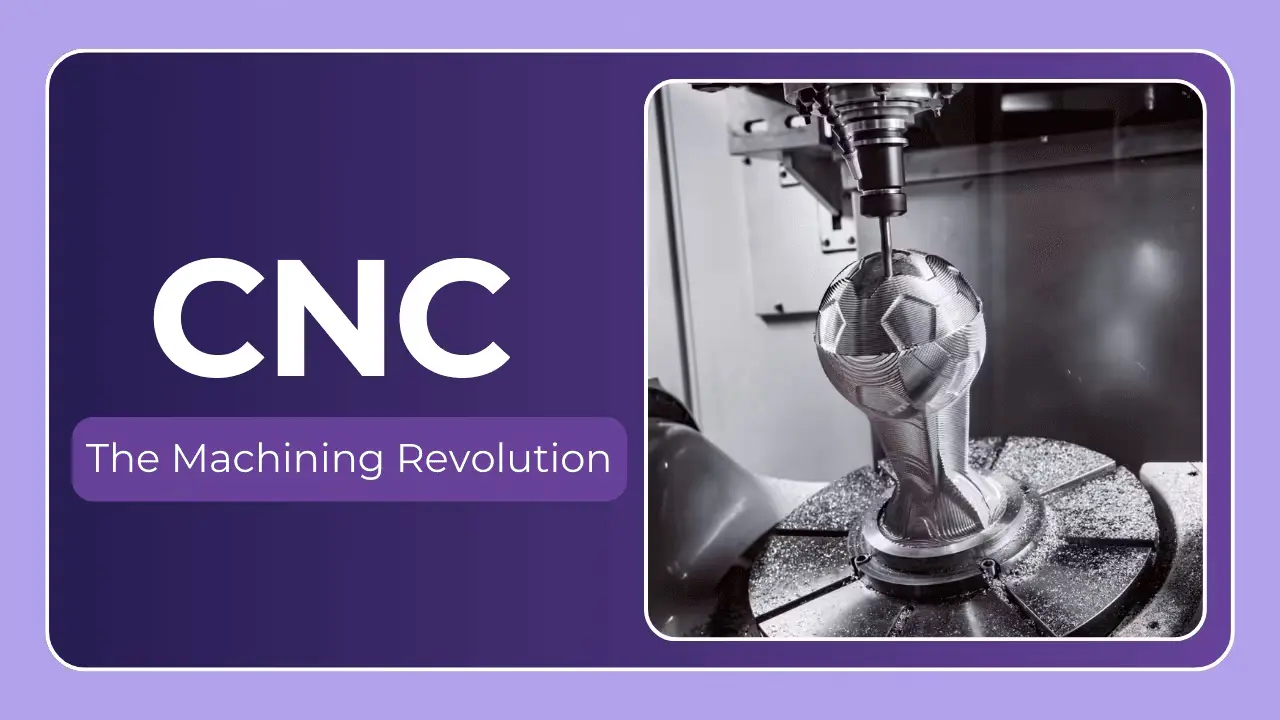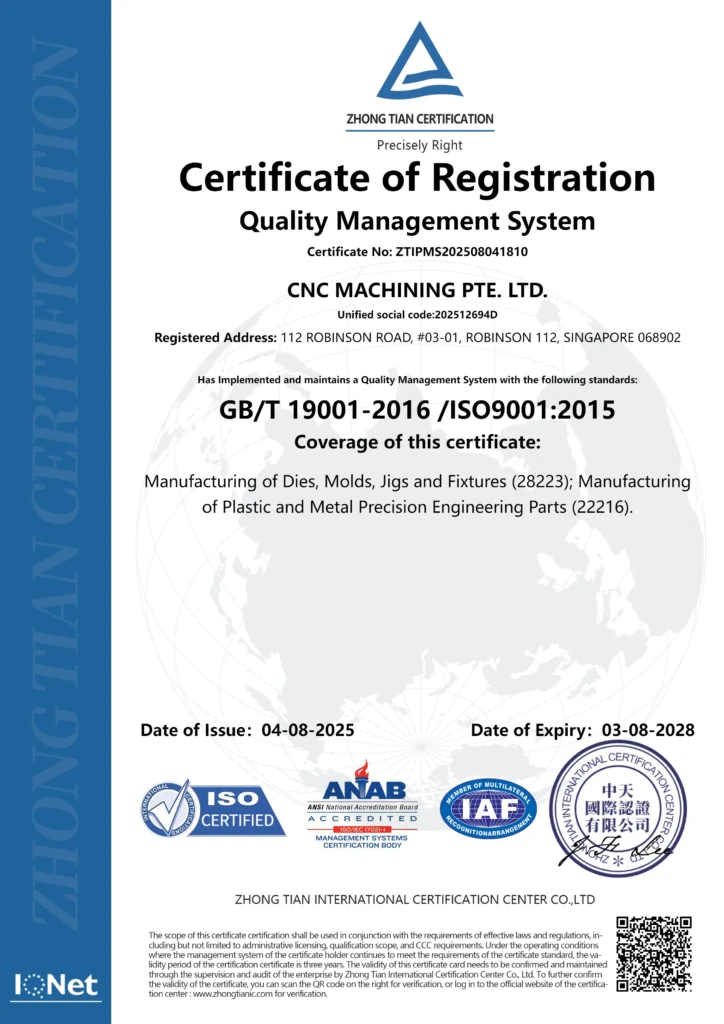A Comprehensive Guide to CNC Plastic Machining
Plastic, as a material, has revolutionized manufacturing. Its versatility, lightweight properties, and cost-effectiveness make it ideal for a vast range of applications, from aerospace components to everyday consumer goods. But achieving the intricate shapes and tight tolerances often demanded by modern designs requires more than just traditional methods. This is where CNC plastic machining comes in. At CNC MACHINING PTE. LTD, a leading five-axis CNC machining manufacturer in Singapore, we specialize in precisely transforming plastic materials into high-quality, customized components. This guide will delve into the intricacies of CNC plastic machining, covering materials, processes, design considerations, finishing techniques, and why choosing the right partner is crucial.
What is CNC Plastic Machining?
CNC (Computer Numerical Control) machining uses pre-programmed computer software to direct cutting tools and remove material from a plastic workpiece, resulting in a precisely shaped part. Unlike traditional methods like injection molding, which are best for high-volume production, CNC machining excels at low to medium volume runs, prototypes, and complex geometries. It’s a subtractive manufacturing process – meaning material is removed to create the desired shape – offering excellent accuracy and surface finish.
Why Choose CNC Machining for Plastics?
Several factors make CNC machining an outstanding choice for working with plastics:
- Design Flexibility: CNC machining can create incredibly complex geometries that are difficult or impossible to achieve with other manufacturing processes.
- Material Versatility: A wide range of plastics can be machined, each with unique properties.
- Rapid Prototyping: Quick turnaround times allow for rapid iteration and testing of designs.
- Low to Medium Volume Production: Economical for smaller production runs where tooling costs for injection molding are prohibitive.
- High Accuracy & Precision: CNC machining delivers parts with incredibly tight tolerances.
- Excellent Surface Finish: Achievable surface finishes are often superior to those from molding, reducing or eliminating the need for secondary operations.
Common Plastics Used in CNC Machining
The selection of the right plastic is pivotal to the success of your project. Here’s a breakdown of commonly machined plastics, along with their key characteristics and typical applications:
| Plastic Type | Key Characteristics | Typical Applications | Machinability Rating (1-5, 5=Easiest) |
|---|---|---|---|
| Delrin (Acetal) | High strength, stiffness, dimensional stability, low friction. Excellent chemical resistance. | Gears, bearings, pump components, fasteners | 4 |
| Polycarbonate (PC) | High impact strength, transparency, heat resistance. | Safety shields, lenses, enclosures, medical devices | 3 |
| Acrylic (PMMA) | Excellent clarity, weather resistance, good dimensional stability. | Displays, lenses, signage, lighting fixtures | 4 |
| ABS (Acrylonitrile Butadiene Styrene) | Good impact strength, rigidity, and processability. Lower cost. | Automotive trim, enclosures, prototypes | 3 |
| Nylon (Polyamide) | High strength, toughness, wear resistance, self-lubricating. | Gears, bushings, bearings, electrical connectors | 2 |
| PTFE (Teflon) | Exceptionally low friction, excellent chemical resistance, high temperature resistance. | Seals, bearings, chemical processing equipment | 1 (Requires specialized tooling) |
| PEEK (Polyether Ether Ketone) | Highest performance plastic – extreme temperature resistance, chemical resistance, strength. | Aerospace components, medical implants, demanding industrial applications | 2 |
| Polypropylene (PP) | Good chemical resistance, lightweight, flexible. | Containers, packaging, automotive parts | 3 |
Machinability rating is a general guide; actual machinability can vary based on grade, formulation, and machining parameters.
The CNC Plastic Machining Process: A Step-by-Step Look
- Design and CAD Modeling: The process begins with a 3D CAD (Computer-Aided Design) model of the desired part. This model is crucial for generating the toolpaths.
- CAM Programming: CAM (Computer-Aided Manufacturing) software translates the CAD model into machine-readable instructions (G-code) that control the CNC machine’s movements. The CAM software instructs the machine on which tools to use, cutting speed, feed rate, and depth of cut.
- Material Selection & Preparation: Choosing the appropriate plastic material is crucial. Raw material is typically supplied in stock shapes like rods, sheets, or tubes.
- Setup and Fixturing: The plastic workpiece is securely clamped or fixtured to the CNC machine’s table. Proper fixturing prevents vibration and ensures dimensional accuracy.
- Machining: The CNC machine utilizes rotating cutting tools (mills, drills, lathes) to remove material according to the programmed toolpaths. Coolant/lubricant is often used to dissipate heat, lubricate the cutting tool, and flush away chips.
- Deburring & Finishing: Once machining is complete, any burrs or sharp edges are removed. Additional finishing operations (discussed below) may be performed to achieve the desired surface finish and dimensional accuracy.
- Quality Control & Inspection: The finished part undergoes rigorous inspection to ensure it meets the specified tolerances and quality standards.
Design Considerations for CNC Plastic Machining
Designing for CNC machining can optimize manufacturability and reduce costs. Here are some key considerations:
- Draft Angles: Incorporate slight draft angles (typically 1-2 degrees) on vertical walls to facilitate easier removal of the part from the fixture and improve surface finish.
- Corner Radii: Avoid sharp internal corners. Rounded corners (radii) are easier to machine and reduce stress concentration.
- Material Thickness: Ensure sufficient material thickness to support machining operations and prevent warping or deflection.
- Tool Access: Design features that allow the cutting tool to access all areas of the part. Undercuts may require specialized tooling or multiple setups.
- Hole Placement: Consider the diameter and depth of holes. Deep, narrow holes may require specialized drilling techniques.
- Dimensional Tolerances: Specify realistic tolerances based on the machining capabilities and material properties. Tighter tolerances increase manufacturing costs.
Finishing Options for CNC Machined Plastics
While CNC machining can deliver excellent surface finishes, several finishing options can further enhance the appearance and functionality of the parts:
- Deburring: Removal of sharp edges and burrs.
- Polishing: Achieves a high-gloss, smooth surface.
- Bead Blasting: Creates a matte, textured finish.
- Vapor Smoothing: Utilizes chemical vapors to melt the surface layer, resulting in a smooth, polished-like finish (particularly effective for ABS).
- Painting/Coating: Provides color, protection, or specialized properties (e.g., UV resistance).
- Ultrasonic Welding: Joining plastic parts using high-frequency vibrations.
Why Choose CNC MACHINING PTE. LTD.?
At CNC MACHINING PTE. LTD., we understand the unique challenges and opportunities presented by plastic machining. We offer:
- Five-Axis Machining Capabilities: Our advanced five-axis CNC machines allow us to create incredibly complex geometries with unparalleled precision.
- Material Expertise: We work with a wide range of engineering plastics, guiding our clients through material selection based on application requirements.
- Integrated Services: We provide a complete solution, from design assistance and prototyping to full-scale production and post-processing services like polishing and coating.
- Quality Assurance: We employ strict quality control procedures and utilize advanced inspection equipment to ensure that every part meets your exact specifications.
- Competitive Pricing and Fast Turnaround: We are committed to delivering high-quality parts at competitive prices with quick turnaround times.
Conclusion: Partnering for Precision & Innovation
CNC plastic machining is a powerful manufacturing process that unlocks possibilities for complex designs, rapid prototyping, and custom production. Selecting the right material, understanding design considerations, and choosing a capable machining partner are essential for success. At CNC MACHINING PTE. LTD, we are dedicated to providing our clients with exceptional CNC plastic machining services, delivering precision, quality, and innovation.
Ready to bring your plastic part ideas to life? Contact CNC MACHINING PTE. LTD. today for a quote and let us help you customize your precision parts at the best price!




